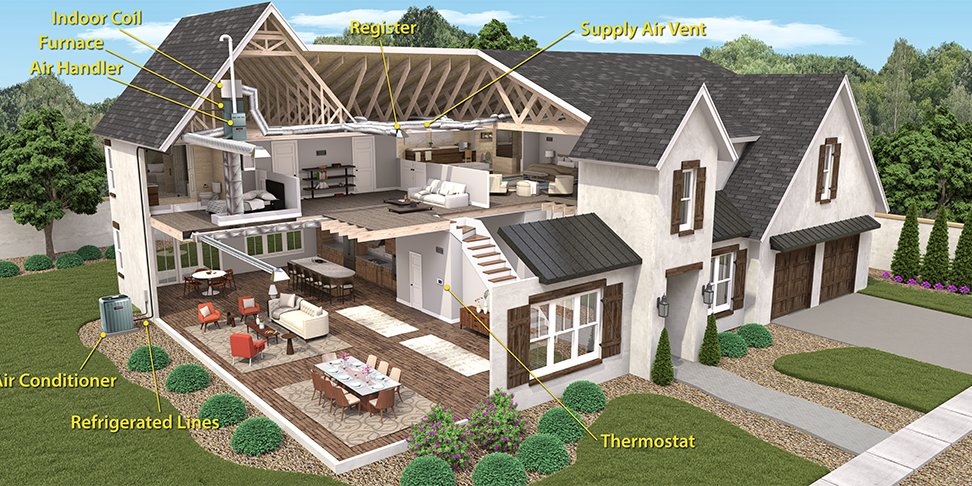The design of your property’s Heating, Ventilation and Air Conditioning (HVAC) system are just as important as any other crucial aspect of your home. The design of your HVAC system goes beyond the temperature within the residence. While it might not be the most appealing topic of conversation, HVAC design has an impact on everything from airflow to efficiency, cleanliness of the air, noise levels and more.
An inefficient HVAC unit could mean you will pay more for heating and air conditioning in your house in the long run. Poor airflow within your home could lead to reduced air quality which in turn can impact the health and wellbeing of residents. For those looking to make their home a sanctuary, noise levels could make a huge difference in achieving this goal.
Before we delve into the design aspect of an HVAC system for a typical residential dwelling, it’s important to understand that there are several types of systems to consider. Listed below are some of the most common HVAC systems used in Ontario:
● Furnace and AC
● High Velocity
● Ductless Split
● Hydronic

A combination of the furnace and air conditioning (AC) system:
The most common residential HVAC system is one that combines the functions of a furnace and those of an outdoor condenser. The heating is done by burning propane or natural gas which generates heat in the furnace’s burner. The heat produced then passes through a heat exchanger which makes it hot. Return air of the house is blown over the heat exchanger resulting in the generation of warm air. During the cooling season, while the furnace burner is off, the blower along with coils, outdoor condenser and refrigerant piping is utilized to cool the air. The heated and cooled air is then distributed within the building through a set of ductwork, supply air registers and return air grilles.

High-velocity HVAC system:
While similar to traditional heating and cooling systems in some ways, the High-Velocity HVAC system operates with the use of a boiler, air handler and air condenser. The air within the building is circulated through smaller round rigid ductwork with a much higher velocity compared to conventional forced air systems. A major difference is that it does not require large air diffusers on the floor or ceiling with large round connections. Instead, small diameter flexible tubing that can run inside walls and between joist spaces along with round small vents are utilized in this system which takes up much less space compared to traditional forced air systems.

Ductless split system:
A series of individual HVAC units that are set up for each room in a house in addition to an outdoor condenser unit make up the ductless split system. This system can be pricey, however, there are major perks which can offset the cost in the long run. Some of the benefits of this energy-efficient system include independent control of the temperature for each room and not having any ductwork and bulkheads. Keep in mind, that these systems require regular maintenance and cleaning.

Hydronic in-floor heating system:
The hydronic system is different from the other HVAC systems described above in that it utilizes circulating liquid as a heat-transfer medium. Hydronic systems can be divided into hot water or chilled water types, but there are many possible configurations for this type of system. This system is highly efficient as it requires less energy to circulate liquid than it does to force air through ducts. The liquid is continuously re-used throughout the system and the primary cost will be to power the boiler, pumps and other apparatus.
We have compiled a list of important factors to consider when it comes to the design of residential HVAC systems:
- Educate yourself on the various systems available – review the list of systems above and get to know what each type of system can offer. Make a list of the pros and cons for each as the system pertains to your home. Through a process of elimination, narrow it down and zero in on the most suitable option for your circumstances.
- Energy efficiency is key – This is true not only for environmental reasons, an energy-efficient home will ensure the structure maintains heat during the cold winter months while remaining cool during the hot spells of summer. An energy-efficient unit lowers the energy usage of your system while also helping to lower your utility bills.
- Cost-effectiveness goes beyond the cost of the HVAC system – Choosing the right HVAC unit for your home goes beyond the cost of the system. Purchasing the cheapest unit on the market might be an efficient way of saving money in the short term but remember, your HVAC unit could be part of your home for decades to come. Consider savings over the long term rather than looking at short-term solutions.
When selecting the HVAC system for your home, it is important to be aware of the options available and to do some research about which one is the most suitable for you.
Contact Optimal Engineering for any HVAC design-related consultation. Our team of experts will assist you to create the best strategy for your new HVAC system.







